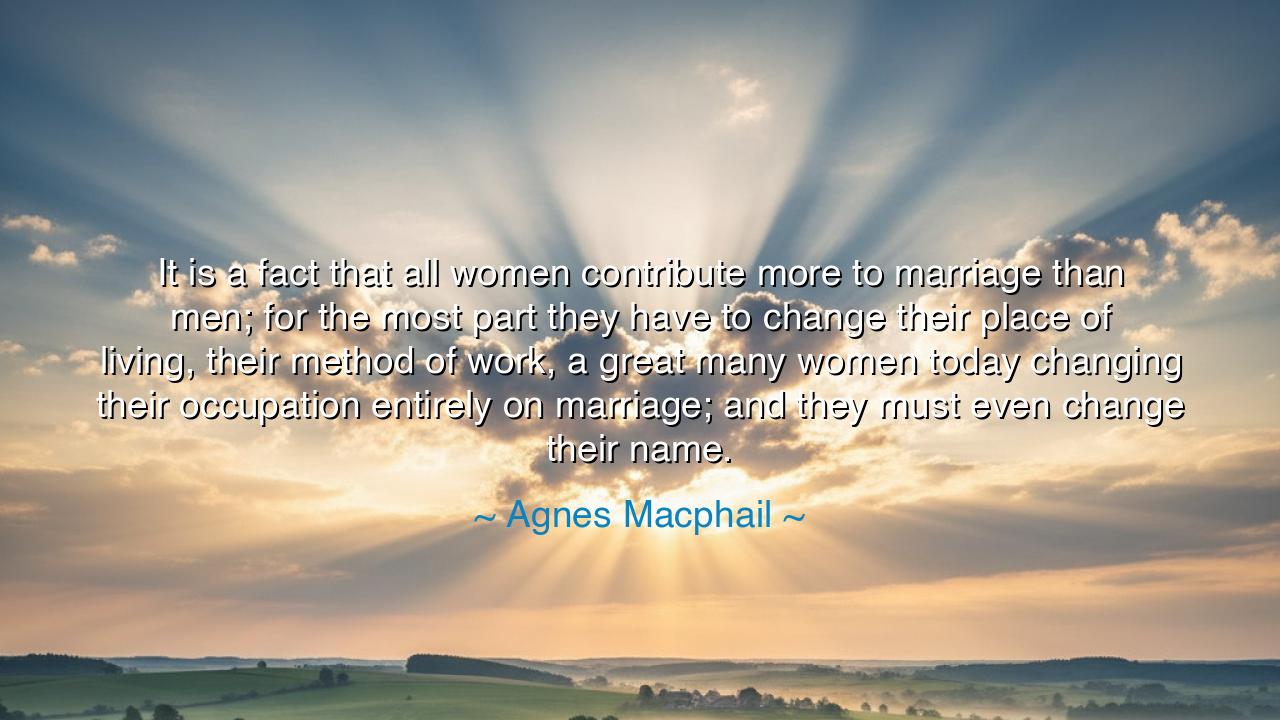
It is a fact that all women contribute more to marriage than men;
It is a fact that all women contribute more to marriage than men; for the most part they have to change their place of living, their method of work, a great many women today changing their occupation entirely on marriage; and they must even change their name.






Hear now the solemn words of Agnes Macphail, the first woman elected to Canada’s Parliament, a voice that rose in an age when silence was demanded of women: “It is a fact that all women contribute more to marriage than men; for the most part they have to change their place of living, their method of work, a great many women today changing their occupation entirely on marriage; and they must even change their name.” This is not merely a statement of observation, but a lament carved from the long struggles of women, whose sacrifices within the bond of marriage have often been unseen, unmeasured, and unreturned.
The meaning of her words is sharp and clear: in the structure of society as it stood, women bore the greater burden when entering into marriage. They left behind their homes, their kin, their livelihoods, even their very names. A man might continue in his trade, his city, his identity, yet the woman was asked to uproot herself and be replanted in the soil of her husband’s world. Thus, marriage—though heralded as union—was not equal in sacrifice. It demanded more of the bride than of the groom.
The origin of this truth lies deep in the customs of patriarchy. For centuries, the laws and traditions of many lands made woman the dependent of man. She was expected to forsake her name, for it symbolized her father’s line, and take her husband’s, as if she herself were transferred like property. She was asked to abandon her labor if it did not suit his station, to bend her life around his. Even the act of moving into his home signified that she was the one absorbed, while he remained unchanged. Macphail, with her piercing insight, unveiled this imbalance, and spoke it aloud so that others might awaken.
Consider the life of Eleanor Roosevelt, wife of President Franklin Roosevelt. She too faced the expectation that her role was to serve silently at his side. Yet she transformed that burden into power: while her husband governed, she forged her own path as an advocate for human rights, reshaping the meaning of “First Lady.” She changed her place of living, her daily work, even the sphere of her influence—but unlike many of her time, she turned those sacrifices into strength. Still, her story reminds us of the truth Macphail spoke: women were the ones compelled to adjust, to reshape, to sacrifice in order to preserve the marriage bond.
This truth carries both pain and warning. Pain, because it shows how countless women have surrendered more of themselves than they were ever asked to receive in return. Warning, because where sacrifice is demanded unequally, resentment and imbalance take root. A partnership that asks one to give more and the other less is not a true union but a hidden chain, and such chains choke the love they were meant to protect.
The lesson is this: if marriage is to endure as a noble institution, it must be forged on mutual sacrifice and mutual respect. Let not the woman be the only one to change her name, her work, her home, her way of life, while the man remains untouched. Let him also bend, let him also yield, let him also reshape his path for the sake of their union. For in the balance of sacrifice lies the strength of love, and in the sharing of burdens lies the true equality of souls.
Therefore, children of tomorrow, take heed. Do not preserve customs that strip one partner of identity while exalting the other. Instead, build marriages where both give and both receive, where both plant roots and both grow anew. Question traditions that demand silence from one and freedom from the other. Seek a union that honors the individuality of both while weaving them together in shared purpose. For only then will marriage cease to be an unequal burden, and become instead the harmony of two souls walking side by side, each honored, each free, each whole.






AAdministratorAdministrator
Welcome, honored guests. Please leave a comment, we will respond soon